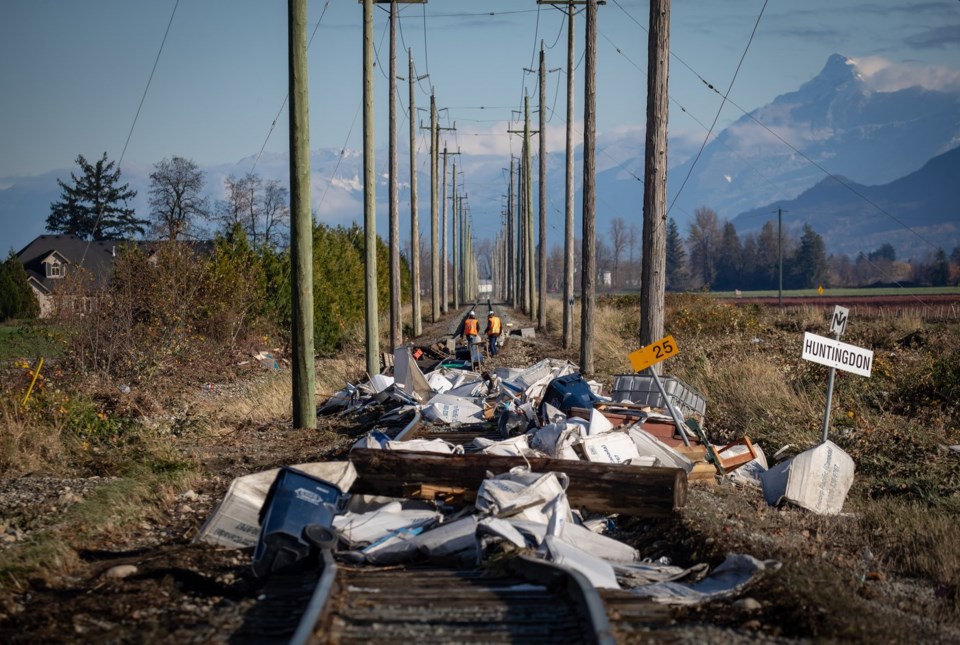VANCOUVER — CN Rail warns flooding could have "catastrophic impacts" on cross-country services in legal action it has filed to force Parks Canada to consider a protective barrier for its main line through Jasper National Park.
Canadian National Railway Co. says in a Federal Court application that Parks Canada has wrongfully held up the work for nearly eight years by refusing to allow proposals to undergo environmental impact assessment.
The railway says Parks Canada is opposed to a proposal to use gravel dredged from the river to construct an anti-flooding berm.
The application filed last month says a portion of its main line that connects B.C. ports with the rest of the country is endangered by the risk that the Snake Indian River in the park will rapidly change course, in a phenomenon known as avulsion.
"CN’s independent experts have concluded that the river adjacent to the CN main line is at impending and inevitable risk of a sudden and unpredictable avulsion in which the river will overtop its banks, rapidly abandon its existing channel and form a new river channel flowing directly downhill toward the main line," the application says.
"An avulsion would have catastrophic impacts."
The railway company says such an event could cause "significant destruction" of its main rail line, "long-term cessation" of east-west rail service, and a potential "catastrophic train derailment."
It says the main line is critical infrastructure for the Canadian economy.
The company declined to comment on the legal action, and Parks Canada did not provide comment on the company's claims by press time.
CN's application says the river overtopped its banks in 2016 due to winter ice jams, which required "extensive emergency response measures in dangerous winter conditions" to protect rail infrastructure.
It says numerous studies have warned the river is at high risk of flooding in winter and summer, posing "a real and imminent risk to CN's main line."
CN's application says fixing the line if the river spills its banks would require work of "unknown scope and duration."
The company, the application says, has been working on proposals for long-term flood prevention since 2017, but Parks Canada has allegedly held up an impact assessment for nearly eight years.
"During that time, Parks Canada has repeatedly issued new and evolving guidance about how it conducts impact assessments," the application says. "CN’s proposals have been repeatedly rebuffed by Parks Canada."
CN says it presented its latest proposal to the agency in January 2024, with two options for the construction of a "flood containment berm," one using material brought from outside the park, and the other with gravel dredged from the river bed.
The second option, the application says, would have the additional effect of deepening the river, allowing the berm to be "significantly smaller in size and have less of an impact on the adjacent habitat."
Parks Canada has indicated in the past that it supports construction of a berm, according to a letter cited in CN's application, but is opposed to using materials from within the park.
CN estimated in 2020 that bringing in gravel and other material by truck and train would take two years on an "optimistic schedule," requiring approximately 2,000 truckloads and more than 1,200 full rail cars.
"If the material was transported by truck alone, it would require over 200 days of trucking and approximately 4,000 truck trips," the application says.
Parks Canada rejected the idea of dredging the river, CN says, because the proposal "does not conform with the regulatory and policy intent for a declared wilderness area in Jasper National Park."
The railway's application seeks to overturn Parks Canada's decision denying its bid for an impact assessment.
"CN still does not know precisely what is required in order to advance its proposal to impact assessment, despite having provided far more information and detail than is required prior to an impact assessment," the application says.
This report by The Canadian Press was first published June 13, 2025
Darryl Greer, The Canadian Press



